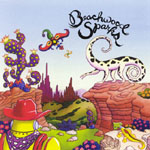|
|
 |
Dusted Reviews
Artist: Beachwood Sparks Album: Make The Cowboy Robots Cry Label: Sub Pop Review date: Jun. 4, 2002 |

|
|
|
 |
The Beachwood Sparks’ new album Make The Cowboy Robots Cry, is a beautifully seamless construction continuing the epic glories sought on last year’s surprisingly masterful, Once We Were Trees. It’s abundantly clear from the initial strains of the rolling tumble weed harmonica introduction – which blows casually through the porch swing tempo of the album’s opener, “Drinkswater” – that you are once again ensconced in the inimitably serene world of The Beachwood Sparks. Their world – a near perfect marriage of the late-60’s sound pioneered by the likes of The Byrds and Buffalo Springfield and the disparate (indie, post-rock, lo-fi roots) of the Sparks’ constantly evolving cast of contributors – results in a potent mix of musically dense yet supple song structures.
The Sparks are at their most poignant and convincing when they stray from the banjo-driven, trippy formula that dominated the majority of their first album, and visit the more expansive, bucolic settings of songs like “Let It Run” and “By Your Side,” both from Once We Were Trees.
The results here are no less inspiring. On “Ponce De Leon’s Blues,” Gunsts’ gorgeously caressing vocals merge courageously with the soaring drive of Shers’ organ blasts. The tantalizing pedal steel, along with Mia Doi Todd and Ben Knight’s vocal cameos, successfully capture the lonely essence of a love and land starved explorer. Coupled with the majesty of “Sing Your Thoughts” (by far the best Sparks’ song to date), it’s all together mesmerizing and worthy of comparison to the emotional apex reached on the Flaming Lips’ masterpiece – The Soft Bulletin.
Though the album succeeds in almost all of its aspirations, it is not entirely without fault. All six songs are worthy of repeated listens, but “Hibernation” and “Galapagos,” the albums’ two more exploratory pieces, suffer beneath stodgy and inconclusive ideas. “Galapagos” fumbles needlessly long with a clumsily moribund banjo line and the sporadic appearance of disjointed bass morphs. The song revives itself at the very end, but by that time it’s too late. “Hibernation” manages to be slightly more interesting but again, it suffers from the same ineptitude: inertia and incertitude. These brief sound excursions are not without merit. “Hibernation” mines the same heady territory as Joan of Arc and it does so with clearer notions of song craft. As part of another bands repertoire these songs would probably amount to major successes, but they fail for the Sparks because they reject or at least temporarily disengage themselves from the defining harmonic qualities that make their music so consistently interesting.
The Beachwood Sparks are keenly aware of the powerful mood they develop with their slower, more brooding songs. They’re very careful not to jeopardize the fragile theme that binds the first five songs together until, at least, the very end – where the raucous, “Ghost Dance 1492” arises strongly with a lively organ riff and the sleek and expert drumming of new recruit – Jim Hey. “Ghost Dance” is a kind of Country Joe and The Fish style romp that is as fun as the other songs are serious. But it all ends too quickly and you find yourself ejected, entirely unprepared to cope with the sinister realities that exist outside the meticulously constructed and endearing world of The Beachwood Sparks.
Over as it may be, you’ll find the album reforming in your head almost hourly. And as you wade through the day in search of a love, a conversation, an experience as equally compelling as this record, the soothing sounds of The Beachwood Sparks will remain to comfort you – if and when – your expectations are never truly met.
By John Yandrasits
|







